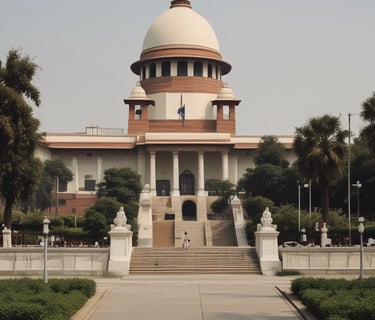Supreme Court Cancels Bail of Gangster Chhota Rajan in 2001 Attempted Murder Case
The Supreme Court has canceled the bail granted to underworld gangster Chhota Rajan in a 2001 attempted murder case, questioning the decision to suspend the sentence of a hardened criminal. The ruling highlights the judiciary’s tough stance on organized crime.


By: Bharat Daily Samachar Date: 17 Sep,2025
Supreme Court Steps In
In a significant ruling, the Supreme Court of India has canceled the bail of notorious underworld gangster Chhota Rajan in connection with a 2001 attempted murder case. The apex court criticized the decision of the lower court that had earlier suspended Rajan’s sentence, asking pointedly: “Why should the sentence of such a man be suspended?”
This development not only marks another setback for the once-feared gangster but also underlines the judiciary’s zero-tolerance approach toward organized crime.
The Case at the Core: 2001 Attempted Murder
The case dates back to 2001, when Chhota Rajan and his associates were accused of orchestrating an attempted murder. Rajan, whose real name is Rajendra Sadashiv Nikalje, has been involved in several high-profile crimes including extortion, contract killings, and smuggling.
While serving multiple sentences for various offenses, Rajan had sought relief in this particular case, claiming deteriorating health as one of the grounds for bail. The lower court granted him bail and suspended his sentence, but the decision faced challenges and eventually reached the Supreme Court.
Supreme Court’s Strong Observations
A bench of the Supreme Court, while reviewing the appeal, expressed serious reservations about allowing leniency in cases involving hardened criminals like Rajan.
The court observed:
“This is not a matter where bail can be granted lightly. Organized crime cannot be trivialized by suspending the sentence of such individuals.”
The apex court stressed that allowing Rajan to remain free would send the wrong signal to society, undermining the justice system’s credibility.
Who is Chhota Rajan?
Chhota Rajan, once a close aide of underworld don Dawood Ibrahim, broke away in the mid-1990s and established his own criminal syndicate. He was involved in numerous gang wars, extortions, and targeted killings across Mumbai and beyond.
Rajan’s fall began when he became a fugitive, living in hiding for decades before being arrested in Indonesia in 2015 and extradited to India. Since then, he has faced multiple trials under the MCOCA (Maharashtra Control of Organised Crime Act) and other stringent laws.
Currently, Rajan is serving life imprisonment in Tihar Jail, Delhi, in connection with the murder of journalist J. Dey in 2011.
Legal Experts Weigh In
Legal experts welcomed the Supreme Court’s decision, noting that it reinforces accountability in cases involving organized crime.
Advocate Ramesh Deshmukh, a criminal law expert, remarked:
“Granting bail to someone like Chhota Rajan weakens public faith in the system. The Supreme Court has rightly pointed out that such decisions must be made cautiously, keeping in mind the larger implications.”
Another expert added that Rajan’s long criminal history makes him a high-risk individual, and any leniency could encourage others in organized crime.
Victims’ Families Seek Justice
Families of those who suffered due to gang-related violence expressed relief at the Supreme Court’s stand. For many, the ruling rekindles faith that justice, though delayed, will not be denied.
A Pune resident, whose relative was targeted in extortion threats allegedly linked to Rajan’s men in the early 2000s, said:
“These gangsters destroyed lives for money and power. Suspending their punishment would have been an insult to the victims. The court has done the right thing.”
Rajan’s Health Concerns vs. Justice
One of the key arguments raised by Rajan’s defense was his poor health condition. Rajan, now in his mid-60s, has faced multiple hospitalizations during his imprisonment. His lawyers argued that prolonged custody could worsen his condition.
However, the Supreme Court clarified that while humanitarian grounds can be considered, they cannot override the seriousness of crimes committed. The bench emphasized that a balance must be struck, but in Rajan’s case, the severity of his offenses outweighs personal health concerns.
The Broader Message on Organized Crime
This ruling is more than just about one gangster. It sends a powerful message to the underworld and society at large—that the judiciary will not compromise with crime syndicates, regardless of the individual’s age, health, or status.
For law enforcement agencies, the decision strengthens their fight against organized crime networks that often attempt to exploit legal loopholes to secure temporary relief.
Political and Social Reactions
Political leaders across parties refrained from commenting directly on the case but welcomed the judiciary’s firm approach. Social activists noted that organized crime has deeply scarred Mumbai’s social and economic fabric, and rulings like this help restore confidence in justice.
On social media, the ruling sparked intense discussion. While some debated humanitarian grounds, the majority lauded the Supreme Court’s “no mercy for mafia” approach.
Conclusion: A Turning Point in Criminal Justice
The Supreme Court’s decision to cancel Chhota Rajan’s bail in the 2001 attempted murder case reinforces the principle that serious crimes demand serious accountability. It reflects the judiciary’s determination to ensure that notorious criminals face the full weight of justice, irrespective of personal circumstances.
For the public, this ruling is a reminder that India’s legal system continues to evolve in its handling of organized crime. For Rajan, it is another blow in a life already marred by violence, betrayal, and imprisonment.
As the gavel came down in the Supreme Court, the message was loud and clear: crime may thrive for a while, but justice will not allow it to prevail forever.
